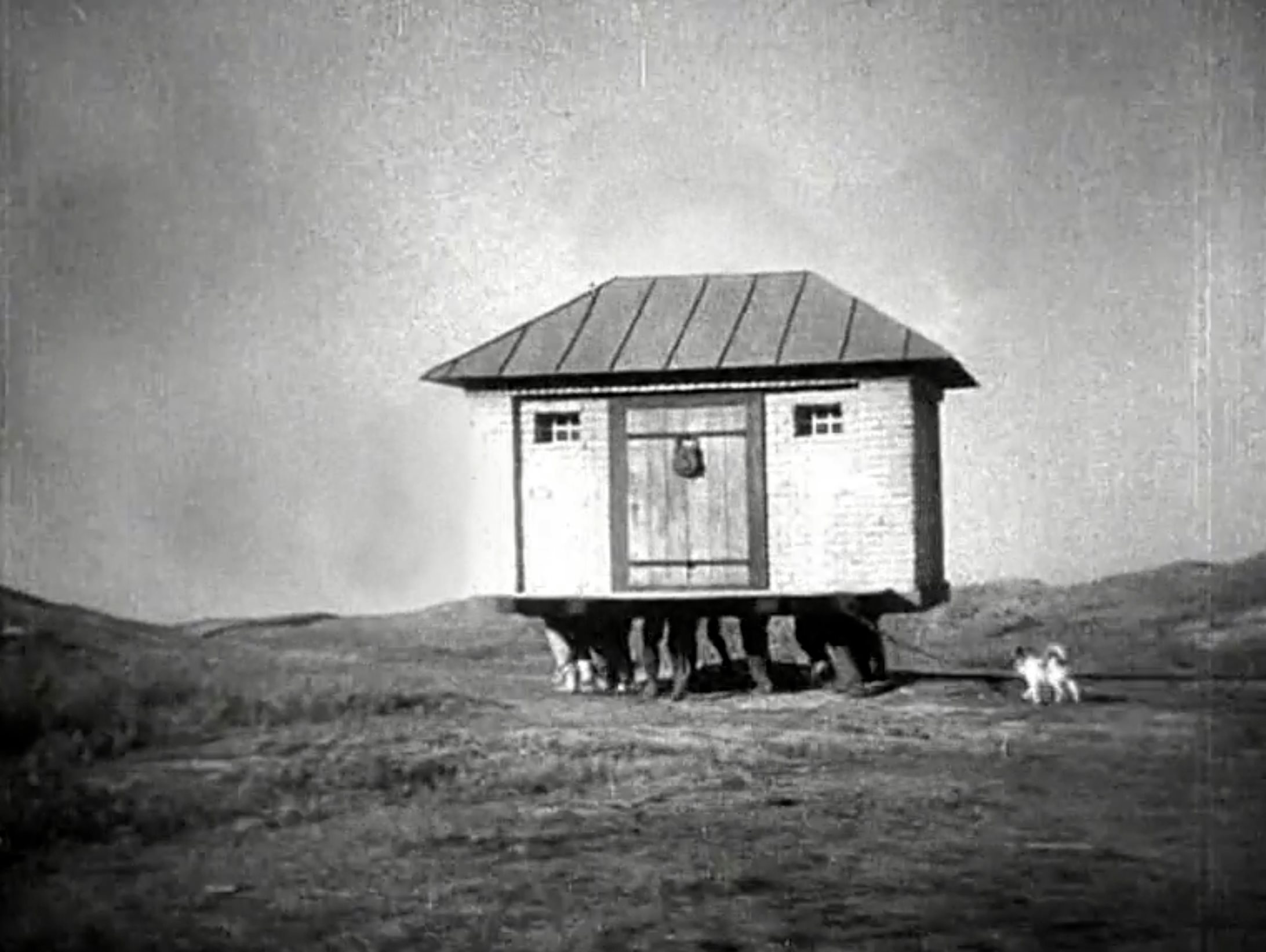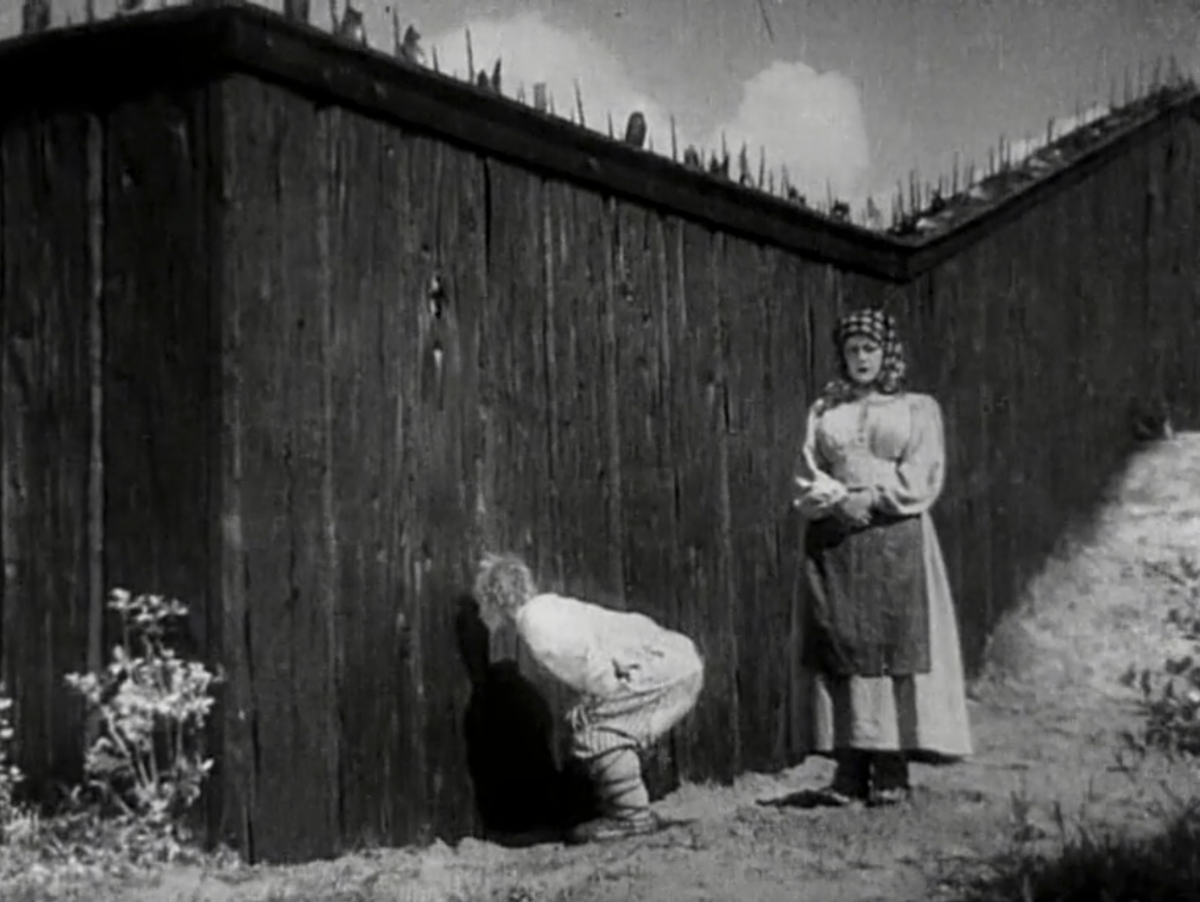
A surreal silent comedy of a peasant named Khmyr and his wife Anna as they try to discover the meaning of happiness. The narrative unfolds over an unrealistic amount of time, taking the couple from pre-Revolutionary days to the time of Stalin and collectivization. Throughout the film, the happiness of the couple is thwarted by a series of absurd and surreal events.
“There was an unknown film, made by an unknown, a superb film, as good as Eisenstein, as popular as Mussorgsky music, astonishing: Alexander Medvedkin’s Happiness. Where was the director? Dead or alive?”
Chris Marker after discovering Happiness in Brussels during a Soviet cinema retrospective1
« A la mémoire de Jacques Ledoux et du moment heureux où, pour la première fois, nous avons vu Le bonheur »
“To the memory of Jacques Ledoux and the happy moment when we first saw Happiness”
Closing card of Le tombeau d'Alexandre [The Last Bolshevik] (Chris Marker, 1993)
“Today I saw our laughter on the screen. (...) Today I saw Medvedkin’s comedy Happiness and I cannot keep quiet about it, so to speak. Today I saw a Bolshevik laughing. (...) Chaplin as a specific kind of approach. Chaplin as something profoundly specific. Chaplin ‘in a new quality’. That is what I felt today, watching Medvedkin’s Happiness.”
Sergei Eisenstein2
“I embrace you and want to see you more often. OUR FRIENDSHIP MUST HAVE NO END.”
Medvedkin, already very ill, in his last letter to Chris Marker3
“Fiction film had always attracted me. (...) [Happiness] was a reaction not to my own inner spiritual requirements, but to the need to help at a most difficult moment, to use the film camera as a weapon, as a machine gun, an offensive weapon, a weapon of mobilisation. [Happiness] was my greatest achievement.
[T]he peasant himself – and this is not just true of our country, it’s part of the social psychology of mankind in all civilised nations – dreams of ownership. He wants a prosperous life, to set himself apart from his thousands and millions of neighbours; he wants to creep ahead and have his own barn, his own horses, his own grain. In short, he wants to be his own boss. Of course, for every 1000, only one will manage it: the other 999 will remain farm-hands and starve, but this dream lives on among the peasants.
But, you know, it’s a very difficult step to give up your horse, to blot out your dream and become involved in a completely different way of life when you don’t know what’s going to happen. So a peasant like Khmyr lived with the dream of his own horse, his own barn, his own grain, his own fence, because his next-door neighbour was eating fruit dumplings while he just licked his lips in anticipation.
So Happiness is a satirical picture. I made it as the nail in the coffin of this rosy dream. I ridiculed that dream because it’s unrealistic: 999 people out of 1000 get nothing from a dream like that. One person gets everything and then he crows about it and tramples the others underfoot. That’s how Happiness was conceived and I think that’s how it worked on the peasant audience, by telling them they had a choice. It was inspired by observations of real life and I did not skimp on tricks, hyperbole, farce, burlesque and all the other methods to make sure that it was very funny and at the same time very effective.”
Alexander Medvedkin4

Opening shot of the film – “What is happiness?”
- 1Le monde, 2 December 1971. Quoted in Emma Widdis, Alexander Medvedkin (London: I.B. Tauris, 2005), 122.
- 2Sergei Eisenstein, “Happiness,” In: Richard Tayler (ed.), Sergei Eisenstein: Selected Works, Volume III: Writings, 1934–47 (London: I.B. Tauris, 1996), 52. Translated by William Powell.
- 3“Iz perepiski Aleksandra Medvedkina i Krisa Markera,” 19 January 1989. Quoted in Emma Widdis, Alexander Medvedkin (London: I.B. Tauris, 2005), 124.
- 4“Interview with Alexander Medvedkin,” In: Richard Taylor & Ian Christie (eds.), Inside the Film Factory: New Approaches to Russian and Soviet Cinema (London/New York: Routledge, 1991), 170-1.

